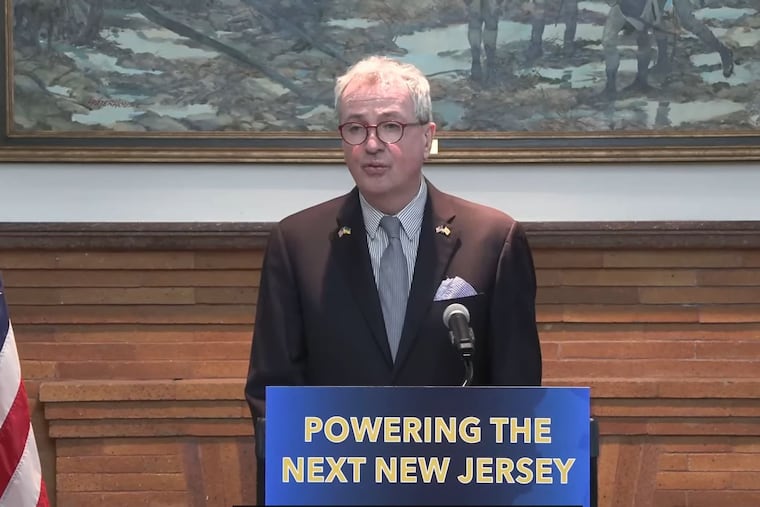New Jersey plans to require all new cars be zero emission by 2035, says Gov. Murphy
The governor also set goals to electrify buildings, proposed rules for flood protection, and announced grants for heavy-duty electric vehicles.

New Jersey Gov. Phil Murphy outlined broad climate goals Wednesday, including creation of a rule adopted by a handful of other states to require all new cars and light-duty trucks sold to be zero-emission by 2035.
The rule would go toward the governor’s accelerated plan to achieve using 100% clean energy in the state by that same year.
Murphy’s goals include getting hundreds of thousands of electric heating and cooling systems, such as heat pumps, installed in homes and businesses, and working with natural gas utilities to make the state less reliant on fossil fuels while still retaining union jobs. He also set goals to electrify buildings, proposed rules for flood protection, and announced grants for heavy-duty electric vehicles.
Murphy’s address was greeted warmly by environmental groups, but the New Jersey Business and Industry Association called instituting the plans in such a short time impractical and questioned where all that clean power would come from given that the state still depends on natural gas.
Murphy said he knew his climate address would provide means for “right wing meme makers” and said there will be people who will “spread lies and misinformation.”
“No one is coming for anyone’s gas stove,” Murphy said. “No one is walking into anyone’s kitchen. No one is going to be forced to do anything, in any way.”
‘Six pillars’
The governor said “six pillars,” three of which are executive orders, would serve as “the foundation for a cleaner, greener, and more resilient New Jersey”:
Accelerate the state’s move to 100% clean energy by 2035, up from 2050. That means all electricity sold in the state would have to come from clean sources. Murphy did not define “clean,” though he mentioned solar and wind in the address. The state counts nuclear power as a renewable energy source.
Help 400,000 homes and 20,000 businesses install “zero-carbon-emission space heating and cooling systems,” such as heat pumps, while making 10% of all low-to-moderate income properties electrification-ready by 2030.
Plan the future of natural gas. An executive order creates a partnership with “utilities, key stakeholders including organized labor, and the New Jersey Board of Public Utilities to plan for the Future of the Natural Gas Utility in New Jersey.”
Allocate $70 million from the Regional Greenhouse Gas Initiative (RGGI) toward lowering costs to buy electric vehicles. RGGI is an effort by a number of states, including Pennsylvania, to cap and reduce carbon dioxide emissions. Power plants buy allowances for every ton of carbon they emit, and the money goes into a fund distributed to the states.
Require all new cars and light-duty truck sales to be from zero-emission vehicles by 2035. Murphy told the state Department of Environmental Protection to adopt a rule by the end of the year in line with California’s Advanced Clean Cars II rule. About seven other states have adopted, or are in the process of adopting, the standard.
Propose a rule by summer to “provide enhanced flood protection for homeowners, businesses, and infrastructure against increased flooding in riverine and coastal areas.”
‘Future of natural gas’
Murphy said a key component of achieving 100% clean energy would be the state’s plan to generate 11,000 megawatts of energy by 2040 for offshore wind, which he called “one of the nation’s most ambitious.”
“These bold targets and carefully crafted initiatives signal our unequivocal commitment to swift and concrete climate action today,” Murphy said.
Further, the governor plans to issue an executive order to direct the BPU “to engage with all stakeholders from across the energy industry, organized labor, the environmental spaces, and the Governor’s Clean Buildings Working Group, to take on the big question of the future of the natural gas utility.”
Anjuli Ramos-Busot, director of the NJ Sierra Club, called the governor’s goals “a significant and needed step to meet the urgency of the climate crisis.”
Ed Potosnak, executive director of the New Jersey League of Conservation Voters, called the actions “bold,” saying they would put the state “at the forefront of the fight against climate change.”
‘Impractical, if not impossible’
Ray Cantor, NJBIA’s deputy chief government affairs officer, said there is “nothing wrong with trying to reduce carbon emissions” but wondered what the cost would be to residents in achieving the transition in such a short time. He noted that only 5% of new car sales in the United States are for electric vehicles now.
“Such a steep ramp-up in electric-only vehicles over 12 years in New Jersey seems impractical, if not impossible, when you consider the lack of charging infrastructure and planning for it,” Cantor said. “Such a policy also begs the obvious question of where all this increased power will be sourced from.”
New Jersey Utilities Association president Rich Henning said that his trade group supports Murphy’s goal of making New Jersey “a clean energy state” but that it “needs to be done in a responsible manner that does not financially devastate the customers our members serve.”
“We know that energy grids across the country have buckled under the weight of heightened clean energy mandates,” Henning said. “We have seen issues arise when good intentions are not matched by proper planning. We cannot let that happen here in New Jersey.”
And Jeff Tittel, a longtime environmental activist, said the governor did not appear to have “any new program or funding mechanisms to get it done.”
“Executive orders without implementation are hallucinations,” Tittel said.